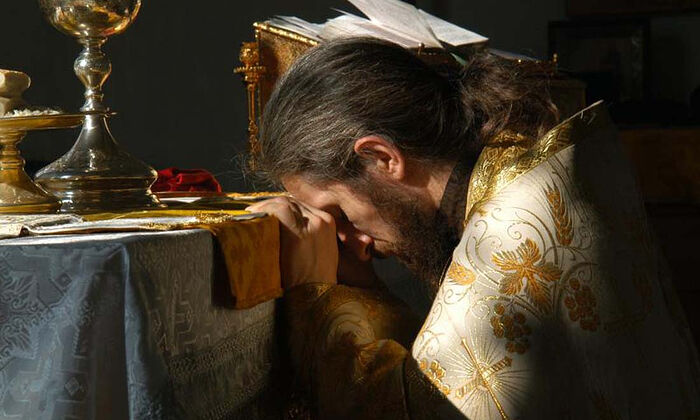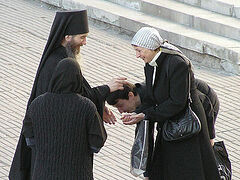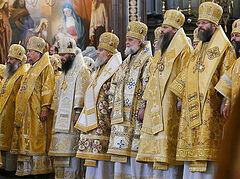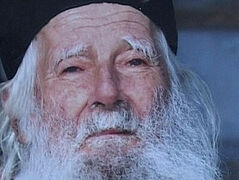Christian priesthood is a Heavenly, not an earthly occupation, because the true priest is appointed by God, not by men, and the goal is first and foremost to lead the people of God to the Kingdom of Heaven.
It’s every Christian’s duty to seek his salvation, and this requires a leader and teacher to lead and teach him the art of salvation. The Orthodox priest is this leader and teacher who is called, by the grace of the priesthood entrusted to him, to celebrate the Holy Mysteries and help others in their salvation. But he himself must have found the way to his salvation and work towards it with earnestness. Despite the importance of all the priest’s pastoral work and teaching, his life in Christ and his struggle in the life of piety and virtue precede every work.
The priest’s principal work is spiritual, but his work can easily transform from spiritual into social activity, due to two factors. The first factor is the weakness in his spiritual life, especially his prayer. The second factor, which comes as a consequence of the first, is the influence of his parish, because of the tyranny of the social factor over the spiritual there. This is why the seriousness of the priest of Christ is demonstrated by his endeavor to sanctify himself. He resists not only every external worldly influence on himself, but affects his flock and directs their minds and lives in a spiritual manner, for the salvation of their souls.
The Gospel has radically separated the spirit of God and the spirit of the world. It’s impossible to resist the spirit of the world in the human soul without the ascetic life. The priest’s love for Christ is expressed by his renunciation of the world and all that is in it, and also by his longing for prayer and fasting, and his vigilance in tireless warfare against his passions and sins. The personal prayer of a priest mustn’t stop, not even for a day, nor should he ever break his fast, regardless of the pastoral circumstances he may encounter. This constitutes a sin and a surrender to the spirit of this world and all his desires, and a stumbling block to his flock; it also encourages them to neglect their fasting. This is why fasting is mentioned so strictly in the holy canons.
God joyously accepts the fasting of His priests as an indication of their abhorrence of their sinful desires. He listens intently to the prayers of those who struggle for Him, which is proof that they love Him more than themselves; such priests please God with faith and works. Some people think that our works and service are enough to please God, but without strong and upright faith in our Christ, our works, no matter how great, are nothing but a filthy rag before Him.
The love of the priest for Christ is most evident in the Mystery of the Eucharist. Participation in this Mystery requires purity of both body and soul. The priest prepares for the Communion of the Mysteries by prayer and fasting from the previous night. He prepares with much silence and his daily prayer rule. Silence and prayer give the priest a state of internal vigilance, to be able to examine his thoughts every night and purify his mind from every single evil thought or hatred, especially towards those who offend him. The priest must pray for those who offend him and reconcile with them, considering that God sends him such people to preserve him in humility. Only abundant humility allows the priest to know himself and see his transgressions as sins, such that he doesn’t justify them, but rather repents of them. Repentance is the first condition for being worthy to participate in the Divine Mysteries.
For the parish senses the virtue of the priest and his life of piety—whether he prays, fasts, repents, forgives, and loves. At the same time, it also senses his greed and all his passions. For the grace of the priesthood doesn’t hide the passions of the priest. The most dangerous among these passions are the lusts of the flesh, love of money, anger, vanity, egotism, and being temperamental. The stronger these passions are within him, the more inevitable his fall into sin.
The beginning of a priest’s fall is his gradual falling away from confessing his passions and sins to a spiritual father, and his fall is fulfilled when he sees himself as perfect in everything and won’t accept any criticism from anyone. When the priest loses his life as a son, he immediately loses his position as a father. When sins accumulate, he no longer sees them as sins because satan justifies them for him and makes him forget them, reminding him only of his glories. Pride gradually grows in the priest when he starts accepting thoughts of superiority and loftiness about himself, given his talents and the honor and trust of his parishioners. Refusing the honor of the people, or even disdaining and fleeing from it is the beginning of salvation; when he considers himself the least among men and that he is unworthy, being granted by God’s grace and compassion to hold the holy things in his hands and celebrate these dread Mysteries. God loves the humble because they repent, and He resists the proud.
In the age of religious globalism and syncretism, the priest must not yield any part of the truth to please his parish, neither in terms of faith nor commandments. Let the priest trust that God will enlighten the humble to be able to change and embrace this truth taught by the Church along with its holy councils, while the proud resist this truth and become more insistent on their personal opinions and convictions inspired by the spirit of syncretism.
The image of Moses and the people complaining to him in the wilderness for forty years is an image of the temptations that a priest who is striving for the salvation of his people may encounter in any parish. How greatly the priest needs a soul made strong by grace, so that he doesn’t weaken and succumb, and much prayer that the Lord might enlighten his people in the knowledge of the truth, tearfully imploring them to repent unto salvation. The prayer of repentance draws the grace of the Holy Spirit, so that God is the leader of this people, while the priest is nothing but an instrument of God, like another Moses. The priest must always develop his faith in God, and rely on Him alone in shepherding his people, not on himself. Pastoral work requires patience, patience requires prayer, and prayer requires denial of self-love. He must love sinners, not judge or avoid them.
The priest must not grow weary from commemorating names of both the living and the departed at the Divine sacrifice, entreating the forgiveness of their sins. Prayer and the Divine sacrifice offered for the life of the whole world, before the judgment of this world comes, are what keep God’s grace working in this world amidst all these evils and transgressions. These names commemorated with the Theotokos and the saints are mingled with the Blood of Christ that was shed for our salvation, to be commemorated on the Heavenly altar in that Divine Liturgy where Heaven and earth, living and dead, are united.
This is also why the Divine sacrifice should be celebrated everywhere, in all parishes on Saturdays, which are dedicated to the departed. It is the priest’s duty to always remind the faithful to pray for the repose of the souls of their departed brethren and for those in need of this holy sacrifice. For they are still alive and share with us in the same body of Christ. Let the priest trust that he contributes to the consolation and comfort of these souls by commemorating them in the Divine sacrifice. Saturday’s Divine Liturgy is as necessary as Sunday’s, where we struggle and pray for the resurrection of our loved ones.
How do the bishop and priest become true successors of the Apostles and members of this cloud of witnesses? The laying on of hands isn’t enough. The laying on of hands and Apostolic succession itself are nullified by any deviation, even if slight, from the dogmas of the faith. The Orthodox truth is above all else; it is the straight dogma; it is love itself and every other virtue; it is the only law upon which all salvation in Christ is founded. Teaching and defending the faith is a duty inseparable from the sacred order of the bishop and priest. This is why it was established—to shepherd God’s people—but in the pastures of the upright faith, and not in the deserts of distorted teachings and the spirit of the age. The bishop is first of all a zealous guardian of Church unity within the Orthodox faith; at a time when heresies are legalized as a perversion, Orthodox truth is dissolved in them
St. Theodore the Studite says: “For it is a commandment of the Lord not to be silent at a time when the faith is in jeopardy. Speak, Scripture says, and hold not thy peace (Acts 18:9)... This is why I, the wretch, speak up, fearing God’s judgment.”
Knowledge and academic degrees aren’t a measure of the priesthood; they are only supplementary factors. The measure is the inner purity of man, his spiritual struggle in obedience, and his absolute fidelity to the Orthodox faith and Church Tradition. These are general conditions for the priesthood that our Holy Fathers spoke about. Otherwise the priest will be a burden on the Church, filling it with stumbling blocks. The bishop will be held accountable for every ordination that doesn’t fulfill these conditions, especially in what is related to faith.
The authentic priest is identified with Christ through obedience, not authority. Authority is complete and canonical when it’s founded on obedience. Obedience is confined to absolute fidelity to the dogmas and canons defined by the one Church of Christ. The commandments of Christ and the canons of the Church are a Divine law that must remain ever before the eyes of the priest, day and night. This is his struggle in a world that has abolished every holy statute that Christ established for His world, in this last age that openly and persistently preaches the law of the antichrist.
Does not the bishop inherit the gift of prophecy that existed in the prophets of the first century of Christianity? He is appointed a prophet to proclaim the truth and reveal the coming delusion to his flock. We have entered the last times and those faithful to Christ await someone to reveal to them the spirit of the antichrist, who is powerfully working in the world now.
The bishop or priest who is deluded by this religious globalism, spread by the contemporary ecumenical movement, and who, in the name of love, mixes Orthodox truth with various delusions—what salvation will he offer his flock? It will only be presented with a bad example and a corrupt faith. Such a bishop or priest has forgotten that he still carries the lamb that was entrusted to him during his ordination—a pledge to be handed over as he received it—the deposit of his first faith and first love.




